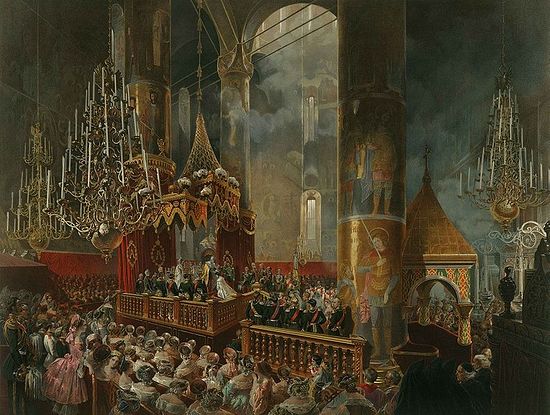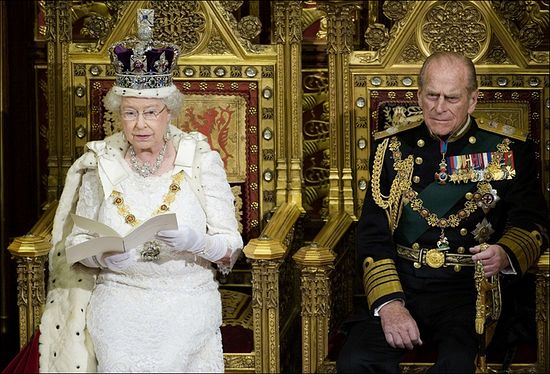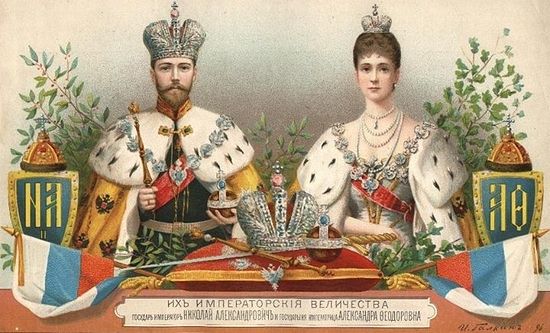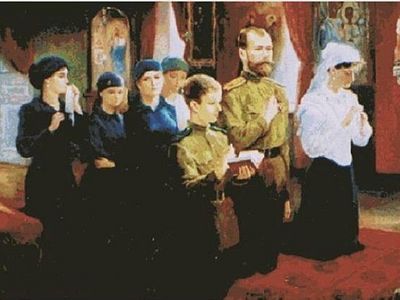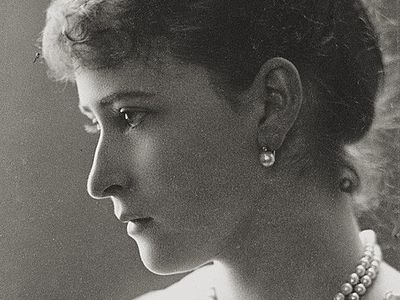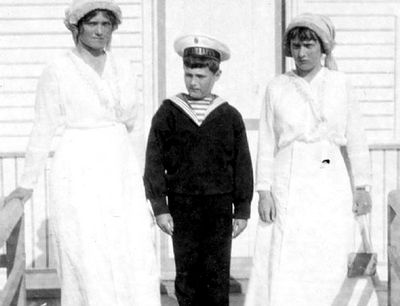When election time comes around once again, a country’s citizens are making judgments, more or less educated, as to which candidate is best for the enormous job of leading the country. With the possibilities presented by modern media it is possible to scrutinize every aspect of their lives, to somehow piece together a picture that either inspires our confidence or mistrust. Choosing a leader has become in most of the world a given right of democracy.
Democracy now implies a purely secular approach to government, but there also exist a spiritual principle as old as the Jewish patriarchs. Is democracy “automatically” the best form of government? Where did the Christian form of monarchy come from? Ryan Hunter explores these questions and more on his blog.
“Lord God of our fathers, and King of Kings, Who created all things by Thy word, and by Thy wisdom has made man, that he should walk uprightly and rule righteously over Thy world; Thou hast chosen me as . . . judge over Thy people. I acknowledge Thy unsearchable purpose towards me, and bow in thankfulness before Thy Majesty. Do Thou, my Lord and Governor, fit me for the work to which Thou hast sent me; teach me and guide me in this great service. May there be with me the wisdom which belongs to Thy throne; send it from Thy Holy Heaven, that I may know what is well-pleasing in Thy sight, and what is right according to Thy commandment. May my heart be in Thy hand, to accomplish all that is to the profit of the people committed to my charge and to Thy glory, that so in the day of Thy judgment I may give Thee account of my stewardship without blame; through the grace and mercy of Thy Son, Who was once crucified for us, to Whom be all honor and glory with Thee and the Holy Spirit, the Giver of Life, unto ages of ages. Amen.”
–Russian emperors’ coronation oath, last spoken by Nicholas II at his coronation in 1896.
“Lord Jesus Christ! Omnipotent Master of heaven and earth! To Thee I deliver the nation and people that were entrusted to my care and purchased by Thy Precious Blood, the children whom Thou didst bestow upon me, and to Thee I surrender my soul, O Lord!”
–Georgian Queen Tamar the Great’s dying prayer, uttered in 1213.
This will be no great tract, for such a lengthy essay it is not in my power at present time to write, and wiser men and women than I have already left the world with so many excellent essays on the virtues of the monarchical system. Instead, let this essay serve as a straightforward and simple enumeration of the benefits of monarchy, its inherent virtues, and natural superiority over the republican form of government presently used by most of the world.
Further, let it serve as a theological reflection on the reality that kingship is the sole political model which is recognized and discussed in the Holy Scriptures, even though several forms of government existed in the world at the time of the Scriptures’ composition. As Christ is often referred to as the eternal King of the ages and the Son of David, let the point stand that the Israelites prior to His coming understood and anticipated His messiahship as a typological fulfillment and full realization of their ancient Davidic kingship. That is, as Israel’s kings were anointed by God and consecrated to their duties of holy service to Him and His people, even carrying out specific priestly roles in the Temple, so too have “pious kings and right-believing queens” of the Orthodox Faith, as defenders of the new Israel, the Church, been understood throughout their existence to be consecrated to their people’s service and anointed by God. Reflecting the highly typological language of the Church, which permeates all of her liturgical services, the role of the Christian king is compared to that of Christ: just as Christ the God-Man unites Himself in loving service to the Church His people, all kings are called to unite themselves in a life of service and martyric dedication to their people.
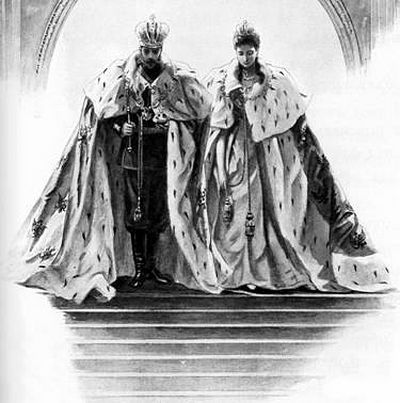 Partners in holy and royal matrimony and equal bearers of the burden of imperial rule, Emperor Nicholas II and Empress Alexandra sketched as they leave the Uspenskiy Sobor in full regalia following their coronation and anointing on 26 May, 1896.
Partners in holy and royal matrimony and equal bearers of the burden of imperial rule, Emperor Nicholas II and Empress Alexandra sketched as they leave the Uspenskiy Sobor in full regalia following their coronation and anointing on 26 May, 1896.
Before Christ’s incarnation, the kings of the line of King David, who was both the Lord’s anointed king and a priest and prophet for His people Israel, served God as the earthly governors of His people, while after Christ’s incarnation—with the world transfigured and time and matter itself made sacred by God Himself having come to dwell among humanity and take on human nature in all things except our sinfulness—Christian kings served God in this way, as stewards, caretakers, and servants of the good order, security, and peacefulness of their people. This is why, throughout Christendom, but especially in the Orthodox East, the rites of coronation and anointing of Christian monarchs emphasize not only their natural and ontological bond with their subjects—an essentially familial bond in which the king is father of his people and the queen the mother of her people—but also the continuation in the Church and with the Church’s blessing of Davidic kingship. Christian kings in general, and Orthodox monarchs in particular, have a claim to the Davidic lineage of kings which has its origins in the very pages of the Old Testament’s books of Samuel the Prophet.
One particularly striking historical reality is the concept of Davidic kingship as it was practiced for some 2,800 years in ancient Abyssinia (modern day Ethiopia). Preceding Christ’s incarnation by some eight centuries, the royal House of Solomon in what would ultimately become (after AD 451) the non-Chalcedonian kingdom of Ethiopia by its very name claimed not only a theological and ontological continuity with the line of David, but, as the Ethiopian Tewahedo Church’s canonical book “The Glory of Kings” (Kebra Negast) lays out, the foundation of the Solomon dynasty is that they claim to be the literal, biological descendants of King David through his son Solomon’s son Menelek. According to the Kebra Negast, Menelek was Solomon’s son and the successor of Solomon’s purported lover Queen Makeda of Axum (mythically Sheba). As the story goes, the young Menelek purportedly brought the original Ark of the Covenant with him to Ethiopia after leaving his father’s kingdom, and while the House of Solomon no longer rules there, it is in Ethiopia, as the Ethiopian Church claims, that the true Ark resides to this day.
Leaving aside the unique claims made by the Ethiopian kings and their Church, which follows the proscriptions of the Mosaic Law more closely than any other Christian communion, the concept of Davidic kingship is one not limited to mere biological descent from King David (however fascinating that possibility is to contemplate), but one of covenantal kingship in which God anoints and consecrates the king and/or queen as His servant(s) who carry out and bear with His grace the burden of the “great service” of governing His people (see the above coronation oath of Russian monarchs). Davidic kingship, by necessity, is a royal lineage or authority which resides only with the people of Israel. Who are the people of Israel today? By this term, I do not mean Israel the geographical spot on a map (which the Romans called Palestina) or Israel the modern Jewish political state established in 1948. Both Israel on the map and Israel the State are not the ontological entity of Israel, the people of God, which, since Pentecost and the coming down of the Holy Spirit, is the Orthodox Church, the “New Israel” of the New Covenant.
Because the Church alone, in heaven and on earth, is the full dwelling place and abode of the Holy Spirit, which blesses and consecrates all things and raises up the human race to the heavenly, in the Church alone rests the ability and authority to bless and consecrate kings and queens to God’s service. This is why, from the first Christian Roman emperors of the fourth century (on through the later Eastern Roman or Byzantine emperors) to the ancient kings and queens of England and France, to the Orthodox emperors and empresses of Russia, Christian kingdoms uniformly understood their monarchs and consorts to be first and foremost God’s anointed servants, endowed by the Church at their coronations with the charism or grace of the Church’s blessing of their “great service”. The Church always understood monarchs’ lives—however grave their individual shortcomings or crimes might be—to have been solemnly consecrated to the Lord’s service from their coronation and anointing, and dedicated to the defense, good ordering, and stewardship of His people.
It goes without saying that, as all presidential republics or parliamentary democracies see authority as primarily coming up temporarily to elected rulers from the people of the nation themselves and not down from God upon divinely anointed and consecrated king and queens, no elected system can theoretically or practically embody, manifest, or make real the solemn and covenantal three-way relationship that exists between God, a crowned and anointed monarch, and his or her people. There is no covenant between President Obama and the American people, nor was there such between any of his predecessors and the people, nor was there between Prime Minister David Cameron and the British people, or President Hollande and the French people. A constitutional oath is not a covenant with God, but merely a promise to the people to respect the existing earthly constitutional laws of the state. Unlike a coronation, at which the new sovereign is mystically and forever joined to his or her people, there is no spiritual dimension whatsoever to the inauguration of a president or the first Cabinet meeting of a prime minister.
An individual president or prime minister may or may not govern well, he or she may or may not be privately a virtuous and ethical person, but whether or not they are virtuous or ethical, never mind pious, devout, and concerned with the state of his or her soul, is of literally no concern to the republican or democratic system itself. It is not so much that democracy or republicanism sanctions or “blesses” the immorality of its rulers so much as both elected systems are 1) entirely unconcerned with morality, 2) founded and enunciated without any real concern for private morality or the idea of corporate, national salvation, and 3) have no authority or license besides a subjective appeal to God or some other kind of transcendent moral framework by which they may appeal to, recognize, or submit to any kind of universal, objective Truth. Democracy is not so much allergic to the notion of objective Truth as it is blind to it; the only real truth in any democracy is the ever-changing will of the people expressed through the act of voting.
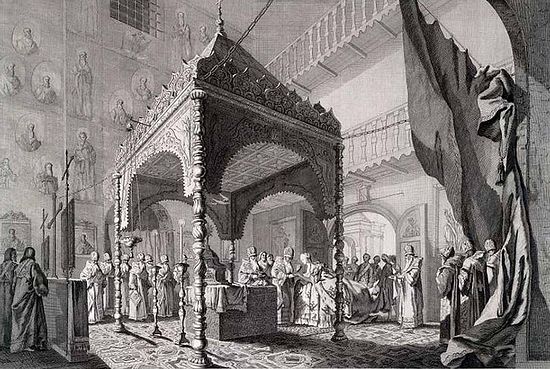 Catherine II communing inside the altar at her Coronation Divine Liturgy, 12 September 1762, Uspenskiy Sobor, Kremlin, Moscow.
Catherine II communing inside the altar at her Coronation Divine Liturgy, 12 September 1762, Uspenskiy Sobor, Kremlin, Moscow.
A democracy or republic’s people may overwhelmingly follow one religion, for example, as in largely Catholic Ireland or Sunni Muslim Turkey or Pakistan, but any appeal by the president or prime minister of that country to that one prevailing religion is, in a republic or democracy, a fundamentally alien appeal grounded in that elected leader’s personal whim or the perceived political expediency of the moment. There is nothing foundationally or integrally religious in either the democratic or republican systems, since all elected systems have as the basis and fount of their authority the fundamentally secularexpression of the popular will, not some sort of objective Truth (e.g. God’s blessing and sanction to reign following His laws and commandments). Even if one approaches the subject of government from an atheistic perspective, and one does not believe in a God who supposedly blesses and sanctifies a monarchy and the rule of the monarchs, it remains inescapable that the political foundation of monarchy is entirely a religious one (the blessing and authority of God), whereas the political foundation of a republic or democracy is an entirely secular construct in which God’s will and His very existence are both utterly irrelevant to the foundation, mission, and legitimacy of the political state. It is of little surprise that the philosophical and ethical foundations of all modern republics and democracies are the writings of so-called “Enlightenment” thinkers who were, without exception, all deists or atheists in their private religious beliefs.
Built entirely on the inherently and inevitably changing expression of whatever happens to be the popular will at a given moment in time, democracies and republics are fundamentally only concerned with whatever might be the will of their voters, and therefore, they are fundamentally not concerned with questions of what constitutes objective Truth, whether such Truth exists, or how to best lead a nation’s people toward that Truth. A republic or democracy’s people may live their lives unconscious of, and the body politic may exist entirely ignorant of, for instance, the Person of Christ, Whom Christians know to be God the eternal Son, yet nothing in the elected “contracts” of a prime minister or president oblige them in the discharge of their office to introduce their people to Christ (or if the country is mostly Muslim, to the teachings of Muhammad found in the Qur’an, etc.). This is because any republic or democracy is fundamentally secular in nature (any republics ostensibly rooted in religion such as the world’s many “Islamic republics” are an existential and ontological aberration with literally no credible, ancient theological foundation within Islam itself.)
Since elected rulers’ authority is entirely secular, as it is derived only from the power and authority conferred by a popular election, it is entirely outside the scope of a president or prime minister’s elected prerogative and therefore, his or her necessarily temporary authority, to understand his or her temporary stewardship of the body politic as one uniquely blessed and sanctified by God. An individual president or prime minister might happen to be a devout Muslim or Christian who believes that God blessed his or her leadership of their country, but there is nothing within the political system over which they preside that recognizes this entirely subjective belief. Whether or not a president or prime minister believes in God or that God may have blessed his or her leadership is fundamentally irrelevant to the discharge and duties of their secular, elected office. The only real blessing in the republican or democratic systems is that of the voter who “blesses” the candidate by voting for him or her in an election.
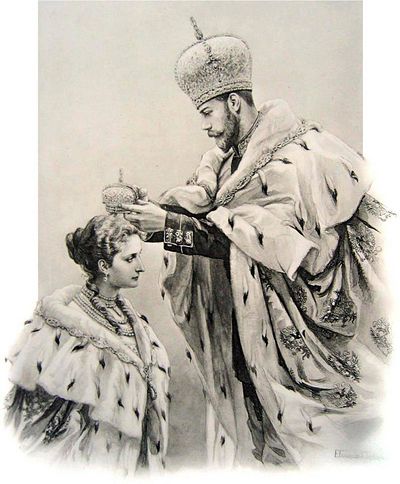 Nicholas II crowned Alexandra as Empress consort immediately following his own coronation. He took off his Imperial crown and touched it briefly to her forehead, symbolizing her sharing in his sacred duty of ruling Russia, and then proceeded to crown her with the smaller consort’s crown.
Nicholas II crowned Alexandra as Empress consort immediately following his own coronation. He took off his Imperial crown and touched it briefly to her forehead, symbolizing her sharing in his sacred duty of ruling Russia, and then proceeded to crown her with the smaller consort’s crown.
This is why democratic republicanism (or republican democracy, however one prefers to order the term) is essentially a secular, entirely non-religious creation. God’s very existence is a matter of literally no concern within the framework of a republican or democratic government, which, taking its authority only from the people, presupposes onlythat the people themselves are sovereign to the degree that their express approval is required for the election of new leaders of the body politic. The only “blessing” that takes place in the casting of ballots at the poll stations or at the later “inauguration” rites in presidential systems is the manifestation of the popular will through the election-based transfer of political power. It goes without saying that the conferring of the people’s will and approval of this or that candidate is an altogether different framework for conferring and recognizing political authority than the solemn anointing and sacred consecration by the Holy Spirit through the Church of a king or queen, or emperor or empress to their people’s service (or, in Islam, the blessing by Allah of a Muslim monarch’s reign).
These musings on the foundational flaws and problems in the republican and democratic political systems beg the question: What is monarchy? Above all else, it a solemn and covenantal service to God in which the monarch is ultimately subject to the Creator to give an account of his or her stewardship and rule over His people. The greatest monarchs in history are those who were the most effective stewards of the good order, prosperity, and peacefulness of their realms. Just as Christianity understands that is natural for men and women to honor, love, and worship their Creator, as man has his very purpose and end in serving and loving Him, so too it is natural for all righteous rulers to honor, love, and worship their Creator, and see themselves as not so much exalted above their subjects so much as the first of His humble servants. The virtues and values of these concepts are entirely alien to the republican and democratic systems, in which God fundamentally does not matter.
Practically speaking, monarchy is the hereditary inheritance and exercise of either political power, ancient ceremonial authority, or both such power and authority, in which the monarch is understood to be the chief servant of the good of his or her realm. The chief good, in a spiritual sense, in any religious society is mankind’s salvation, so for a Christian monarch, it is his or her fundamental duty to encourage, however deemed best, the living of Christian values and a common Christian life by his or her people. For Muslim monarchs, it is their fundamental duty to encourage, however deemed best, the living of Muslim values and a common Muslim life by their people, the same applying to Buddhist monarchs or Hindu monarchs, and so on. The virtue and values of these concepts (of encouraging the spiritual development and transformation of their people) are again fundamentally alien to the republican and democratic systems.
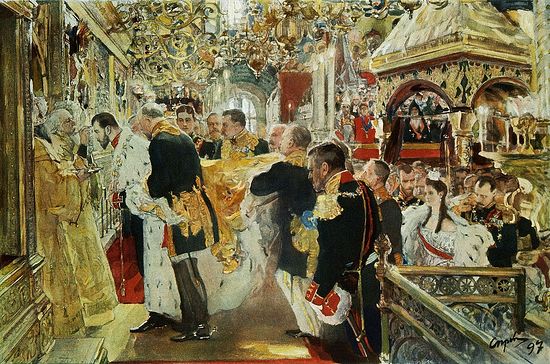 The anointing of Nicholas II, May 1896, Uspenskiy Sobor, with Empress Alexandra waiting behind him for her own anointing.
The anointing of Nicholas II, May 1896, Uspenskiy Sobor, with Empress Alexandra waiting behind him for her own anointing.
Any monarchy in a religious society, in which the monarch’s reign is understood to be blessed by God, is one that must essentially and practically value above all else the corporate salvation of the nation as the highest duty, the highest good and ontological purpose or end of the monarchy and the political state itself. Seeing as all republican and democratic governments are fundamentally not concerned with God or salvation, their leaders understandably do not value this. The greatest purpose or end of a democratic or republican system is, in the baldest sense, the perpetuation and preservation by the dominant party’s elite of their own political power.
It is apparent to any student of history that there have been successful monarchs and terrible monarchs, just as there have been successful presidents and terrible presidents, effective prime ministers and incompetent ones. I would never presume to argue that we should accept various monarchs’ abuses of their authority throughout history, and history is rightfully harsh on monarchs who showed themselves to be either incompetent or tyrannical. Yet, just as the reality that certain presidents and premiers have abused their authority does not singularly prove the defectiveness of democracy as a political system, so too republicans and democrats ought to acknowledge that bad monarchs’ presence in history does not singularly prove monarchy’s defectiveness. My account here is not an ideological defense of the historical record of all monarchs as ‘good’, nor is it a condemnation of all republican and democratic authorities as ‘bad’. Instead, it is an examination of the virtues, benefits, and liabilities of both systems (monarchy and republican democracy), with the implicit realization that in both systems there have been certain authorities who governed better or worse than others.
Nevertheless, I am prepared to argue that, within the framework of political theory, monarchs are actually far more accountable to their people than are elected republican leaders. Most elective, republican systems today are inherently non-theistic in their political constitutions (God does not appear as the ultimate authority and judge of mankind), and thus, their notions of political accountability are completely divorced from God or any notion of objective Truth, salvation, redemption, or eternal consequences. Nothing intrinsic to the nature of the elected office of president or prime minister beholds occupants of either office to see themselves as accountable to God for their exercise of that office. Conscientious presidents and premiers throughout history have naturally held themselves accountable to both God and their people, but this is not something which the elected roles themselves prescribe. In monarchies, on the other hand, the monarch’s accountability to God for their service on behalf of their people is at the very foundation of the office and role itself. This accountability of service is stressed numerous times in the foundational prayers and supplications used in their rites of coronation. It is the primary and defining source of their political authority and legitimacy. An individual president or prime minister might personally believe themselves to rule with God’s help; no monarch may dare to rule without it.
From an iconic Christian perspective, bearing in mind above all else the transformational reality of Christ the God-Man’s incarnation, which sanctifies and raises up human nature to its natural and divine potential, Christian monarchy alone of all forms of political authority has at its core the ideas of self-sacrifice, loving service, individual and collective transformation and growing in holiness, and accountability directly rooted in the Christian Gospel. Of all forms of government, Christian monarchy alone directs and compels those in paramount authority to pursue that which is objectively good and true, because Christian monarchy alone is rooted in, believes in, and is defined as succeeding or failing based on to what extent its rulers foster, pursue, and protect that which is objectively good and true—the corporate and ever-deepening life of the people in Christ. Monarchy alone demands of the ruler an account before God of his or her carrying out of that lifelong role of service and dedication.
To this end, I will share one anecdote: according to Georgian Orthodox priest Fr. Zakaria Machitadze in his book The Lives of Georgian Saints, when Queen Tamar the Great ascended the Georgian throne in 1184 following her father King Giorgi III’s death, she addressed the clergy of her realm with these words outlying the basic duties and obligations of her role as monarch:
At the beginning of her reign, Tamar convened a Church council and addressed the clergy with wisdom and humility: “Judge according to righteousness, affirming good and condemning evil,” she advised. “Begin with me — if I sin I should be censured, for the royal crown is sent down from above as a sign of divine service. Allow neither the wealth of the nobles nor the poverty of the masses to hinder your work. You by word and I by deed, you by preaching and I by the law, you by upbringing and I by education will care for those souls whom God has entrusted to us, and together we will abide by the law of God, in order to escape eternal condemnation.… You as priests and I as ruler, you as stewards of good and I as the watchman of that good.”
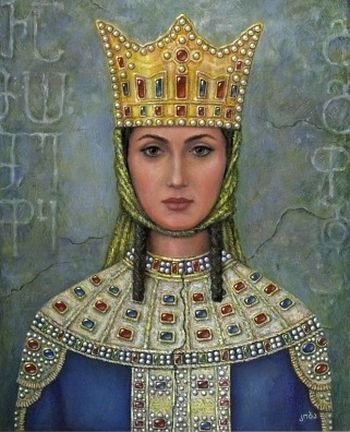 St. Queen Tamar the Great of Georgia (1160-1213, r. 1184-1213).
St. Queen Tamar the Great of Georgia (1160-1213, r. 1184-1213).
In every monarchy in the world, from ancient times to present, all monarchs have been instructed and admonished in their accession celebrations, coronation oaths, or other installation ceremonies with regard to the tremendous ethical responsibilities and sacred obligations incumbent upon their high office. In Imperial Rome, emperors celebrating triumphal processions were acclaimed as the personification of the supreme deity, Jupiter Optimus Maximus, yet at their side throughout the fanfare stood a humble slave, whose duty was to whisper in the emperor’s ear the humbling and haunting words Momento mori: “Remember: you are mortal.” Imperial China, the world’s longest-lasting monarchy, maintained since the Zhou dynasty the concept of the Mandate of Heaven, by which the emperors (called the “Son of Heaven”, Tianzi) were accountable to the gods of heaven (Tian) for their rule and, if they transgressed beyond all bounds of propriety or became so ineffective that they endangered the empire, the divine mandate to rule could be withdrawn and transferred to someone else worthy of holding it.
While elected civil authorities today commonly swear public oaths to maintain and defend the political constitutions of their respective nation-states, monarchs throughout history commonly undertook solemn, public oaths to govern their peoples with mercy, truth, and righteousness, ideals which are emphatically, and inseparably tied to the Christian Gospel. A modern president or prime minister swears only to defend the integrity of a fallible constitutional document composed by men; the Christian ideals of mercy, truth, and righteousness are entirely absent from any elected head of government’s oath. In the history of the world’s other largest monotheistic faith, Islam, monarchs also saw themselves as accountable to God and the precepts put forth in Islam’s holy book, the Qur’an, and recitations from this book featured prominently in the installation rites of the Sunni Ottoman Turkish sultans and Shiite Safavid Persian shahs.
By the very nature of the democratic system in which they operate, democratically elected leaders in republics are accountable in actuality only to ever-shifting opinion polls, the often amoral and conflicting political interests of their most powerful financial supporters, and the media whose presentation of political events often significantly influences voters’ opinion. Even the best republican leaders in history have always had to balance these often conflicting demands of office, so that the pursuit of the ideals of the Truth becomes clouded at best and often instead entirely abandoned in the fray of partisan politics. In contrast, even the worst monarchs in history are, within the monarchical framework, accountable notonly to their people, but especially and ultimately to God for how they serve and reign. By God’s grace all kings reign and ultimately to Him all must give an account of their stewardship. Therefore, a monarch who has spent his or her formative years being trained in the service of their people and in love and fear of God will feel and understand himself or herself to be accountable to history, to their people, and especially to God who rules over all things. This ancient monarchical process of the formation of the ruler as his or her people’s first servant and dedicated defender is a much more time-tested method of producing able rulers than the comparatively recent, modern notion that a previously partisan, highly divisive elected politician will, once sworn into office, suddenly become a moral, ethically driven person able to execute his or her office above partisan interests. Indeed, while history is replete with numerous examples of selfless and dedicated monarchs, I have yet to come across one politician who operated entirely selflessly and without partisan bias.
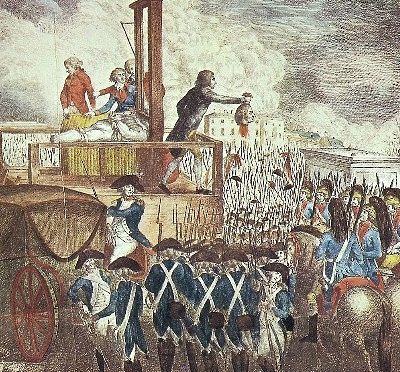 The guillotine, the most infamous killing machine in history, symbolizes the capriciousness, terrorism, and excesses of the Jacobin period of the French Revolution, when thousands died under its blade during Robespierre’s “Reign of Terror” against all suspected opponents of the Revolution.
The guillotine, the most infamous killing machine in history, symbolizes the capriciousness, terrorism, and excesses of the Jacobin period of the French Revolution, when thousands died under its blade during Robespierre’s “Reign of Terror” against all suspected opponents of the Revolution.
Thus, from both a theoretical and a practical viewpoint, monarchs are far truer servants of their state than democratic, republican leaders can ever hope to be. Whether a monarch actively rules (exercising paramount political authority in his or her kingdom) or simply reigns ceremonially, as most do today, his or her coronation or installation oath invariably binds them to serve and reign above all else in remembrance and fear of God, prioritizing the salvation, moral and ethical good, and lifelong service of their people. Democratic and republican constitutional oaths prescribe no such obligations on the part of a president or prime minister.
I include the above coronation oath taken by Russian emperors to contrast it with the oaths of office commonly taken by elected republican heads of state today. Whereas the President of the United States solemnly swears to “faithfully execute the Office of President of the United States” and to the best of his or her ability “preserve, protect, and defend the Constitution of the United States”, the Russian emperors, to use just one example, swear a solemn oath before God and their people to “accomplish all that is to the profit of the people committed to my charge”. The Russian monarchs who were crowned as God’s supreme earthly “judge over Thy people” humbly “bow in thankfulness before Thy Majesty” and acknowledge themselves as subordinate to and servant of their “Lord and Governor”. Likewise, Queen Tamar of Georgia, in her dying prayer, prepared to give her final account to God for “the nation and people entrusted to my care”. A President of the United States is accountable only to voters’ and his or her most influential supporters’ changing opinions of him or her over time, whereas everyone a century ago understood the Russian emperors to be accountable before God and their people for their “great service”, a sacred and solemn obligation far more binding than the temporary discharge of an elected office.
The presidential oath of office does not speak at all of the president’s accountability to either God or his or her people, whereas at the very core of the Russian emperors’ oath is his or her prayer to “in the day of Thy judgment give [God] account of my stewardship without blame”. The highest moral authority referenced in the presidential oath is the Constitution itself, a man-made, amendable, and changing document which so many people in this country somehow treat almost as if it were infallible. On the other hand, in the Russian monarchs’ coronation oath, the highest authority to which the monarch must submit is none other than God Himself, Whose guidance, teaching, and assistance the monarch constantly implores throughout the coronation oath and beyond.
It is telling that nowhere in the coronation oath for Russian monarchs (viewed before the 1905 revolution as absolute autocrats subject to no earthly constitution) is to be found any haughty exultation of their own power or authority, but, instead, a humble prayer that God “teach me and guide me in this great service.” Thus, at the very climax and pinnacle of his coronation as supreme Autocrat of a vast, multiethnic empire, the Russian emperor humbly took on the role of a servant, imploring God’s guidance in his monarchical rule, a role defined above all else as a “great service” to God and his people.
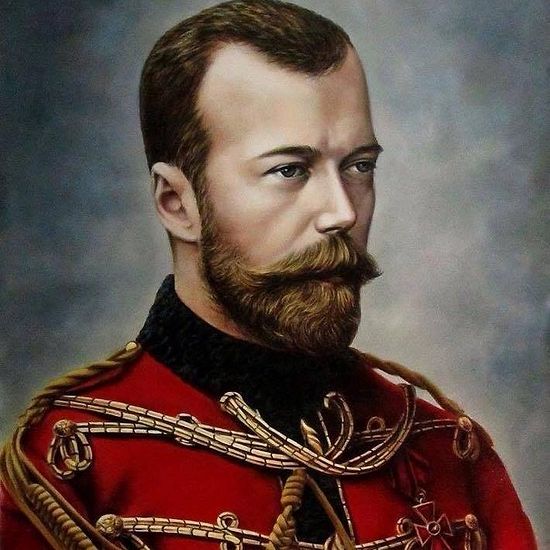 By the Grace of God, His Imperial Majesty Nicholas II Alexandrovich, The Emperor and Autocrat of All the Russias (1868-1918, r. 1894-1917).
By the Grace of God, His Imperial Majesty Nicholas II Alexandrovich, The Emperor and Autocrat of All the Russias (1868-1918, r. 1894-1917).
Just as every Christian family is headed by either a father and mother together or just one of these, so too a monarch, either male or female, serves as the symbolic father or mother of his or her nation. Ideally, the monarch and his or her consort serve together as the typological father and mother of their people. This is a profoundly unifying, supra-political role, and the less the monarch actively involves himself or herself in the nation’s political life, the easier it tends to be for their people to view them in this way. In those monarchies in which the monarch reigns with a crowned consort, we see even further the most natural manifestation of the famille idéale, in which a king/emperor and queen/empress preside together in loving service as the symbolic ‘father’ and ‘mother’ on behalf of their national ‘family’. In a very real and symbolic sense, the monarch and his or her consort serve as the earthly heads of their nation, and, regardless of whether or not they rule politically or simply reign, they serve to embody the Christian ideals of marriage, family life, and domestic unity and tranquility for their people, ideals which are themselves salvific when joined to a common life lived in union with Christ and His Gospel. In any democratic model, by virtue of their temporary and elected, intrinsically partisan office, presidents or prime ministers cannot hope to ever serve in this symbolic way, and the people suffer for lack of a unifying, supra-political father and mother figure to look to for moral example and virtuous conduct. It is a telling example of childhood psychology that boys and girls all around the world play at being kings and queens, never president and prime minister.
It is well known in British history that the Anglican Queen Elizabeth I (1533-1603, r. 1558-1603) repeatedly and publicly referred to herself as England’s bride, England’s wife, and her Kingdom as her husband; what is less well known is that this concept began with her Catholic half-sister and predecessor, Queen Mary I (1516-1558, r. 1553-1558). Sarah Duncan’s book Mary I: Gender, Power, and Ceremony in the Reign of England’s First Queen is a superb resource in this area of research. Since Mary was the first crowned and anointed queen regnant in English history, her reign necessitated the development of new political language to legitimize and confer royal authority on a woman. To justify and legitimize this anomaly of female rule, a new formulation of sovereignty itself was necessary, since it was unprecedented for a woman to rule England. This new development was known as the theory of the “king’s two bodies”, or, for Mary and Elizabeth’s reigns, the queen’s two bodies. It recognized that the monarch has both a “body personal”, which was mortal, and could be female, and a “body politic” — the timeless, immortal Crown and Throne personified in and through the monarch, which passed from one monarch to his or her successor, and so forth, unto eternity.
Fittingly, as kings were compared to Christ, Mary I was compared to the Queen of kings, the Virgin Mary, Queen of heaven, the chief intercessor for Christians. As Duncan shows, it was the oft-forgotten, largely marginalized Mary Tudor, not her half-sister Elizabeth, who invented the concept of the Queen regnant as Mother to her people and “married” to the Kingdom of England.
Since, as an Orthodox Christian, I am fundamentally concerned with my own salvation and especially the world’s, and interested most in Christian monarchy as opposed to the monarchical traditions of other faiths, it is worth examining what the Holy Scriptures, the divine books assembled and compiled by the Holy Spirit acting through Christ’s Body, the Orthodox Church, have to say about government in general, and kingship in particular. Here are just a few examples from an article written here by Fr. Joseph Gleason:
- Psalm 2:10-12 urges “Be wise now therefore, O ye kings: be instructed, ye judges of the earth. Serve the Lord with fear, and rejoice with trembling. Kiss the Son, lest he be angry, and ye perish from the way, when his wrath is kindled but a little. Blessed are all they that put their trust in him.”
- Psalm 24:7 refers to God in the Person of the Holy Spirit as a King: “ Lift up your heads, O ye gates; and be ye lift up, ye everlasting doors; and the King of glory shall come in.”
- Romans 13:1 refers to the divine origins of the “powers that be” (originally kings in every country): “Let every soul be subject unto the higher powers. For there is no power but of God: the powers that be are ordained of God.”
- The Book of Judges repeatedly connects the lack of kingship with the lawlessness and chaos then prevailing in Israel: “In those days there was no king in Israel; everyone did what was right in his own eyes.” (Judges 17:5-6). This refrain “in those days there was no king in Israel” and its equation with lawlessness and injustice appears numerous times throughout the Book of Judges.
- When the Prophet Samuel was an old man, he prepared to leave his sons after him as judges over the people of Israel, but the people of Israel wanted none of them, reminding the prophet that his sons were not righteous men as he was. Instead, they beseeched him to anoint a king for them (1 Samuel 8:1-22).
- Proverbs 16:12 warn that kings must act righteously: “It is an abomination to kings to commit wickedness: for the throne is established by righteousness.”
- Proverbs 20:28 pray that “Mercy and truth preserve the king: and his throne is upholden by mercy.”
- Proverbs 29:14 promises an eternal throne (sainthood) to kings who love the poor: “The king that faithfully judgeth the poor, his throne shall be established forever.”
As Father Joseph Gleason notes in the same article, numerous further Scriptural passages mark kingship as a special vehicle or mechanism by which God communicates with His people Israel and His prophets:
- In Genesis 14, King Melchizedek prophetically acts out the first proto-Eucharist in Scripture, blessing Abraham with bread and wine.
- In Genesis 17, God promises to bless Abraham with kings for descendants.
- In Genesis 35, God promises to bless Jacob with kings for descendants.
- In Genesis 49, God promises that Israel’s kings will come from the tribe of Judah.
- In Deuteronomy 17, Moses lays out the blueprint for Israel to have godly kings.
- In 1 Samuel 2, Hannah prophesies about the coming monarchy (verse 10) in a very positive context, focusing on the Lord’s anointed monarch.
- When Israel’s kings behave righteously, Scripture never suggests that they should have been “good enough to abolish monarchy, and establish some better form of government”.
- Similarly, when Israel’s kings act wickedly, Scripture never suggests that “being a king” was part of their sin.
- In the New Testament, many people spoke Greek, and the entire Roman Empire was deeply influenced by the Greek culture, which had already been aware of democracy for over 500 years. Yet, Jesus and the apostles never suggest that we should replace monarchies with democracies (or with any other form of government). Individual kings are reprimanded, but monarchy itself as a political form is never condemned.
- The apostle Peter tells us to “submit … to the king” and “honor the king“.
- The apostle Paul not only asks us to pray for, but also to give thanks for kings.
- Throughout Scripture, Jesus is referred to as a great King.
- In the book of Revelation, God promises us Christians that we will reign as kings.
From Genesis to Revelation, monarchy is presented in a positive light, as God’s plan from the foundation of the world. (1 Samuel 8 is no exception, as demonstrated in this article on “The Long-Awaited King“ by the same Fr. Joseph Gleason.) Things go well when kingship is practiced in a godly way, and things go poorly when it is practiced in an evil way. But the same goes for any job under the sun. In this particular sense, there is nothing unique about the monarchy.
What do the Church Fathers and early Christian bishops have to say about monarchy and other forms of government? These were men who knew the Scriptures better than any others:
“Monarchy is superior to every other constitution and form of government. For polyarchy, where everyone competes on equal terms, is really anarchy and discord.” –Bishop Eusebius of Caesarea
St Gregory the Theologian says in his Third Theological Oration:
“The three most ancient opinions concerning God are Anarchia, Polyarchia, and Monarchia. The first two are the sport of the children of Hellas, and may they continue to be so. For Anarchy is a thing without order; and the Rule of Many is factious, and thus anarchical, and thus disorderly. For both these tend to the same thing, namely disorder; and this to dissolution, for disorder is the first step to dissolution. But Monarchy is that which we hold in honour.”
We see also, more explicitly in the writings of St Theodore the Studite, found in volume 4 of the Philokalia:
“There is one Lord and Giver of the Law, as it is written: one authority and one Divine principle over all. This single principle is the source of all wisdom, goodness and good order; it extends over every creature that has received its beginning from the goodness of God…, it is given to one man only… to construct rules of life in accordance with the likeness of God. For the divine Moses in his description of the origin of the world that comes from the mouth of God, cites the word: ‘Let us create man in accordance with Our image and likeness’ (Genesis 1.26). Hence the establishment among men of every dominion and every authority, especially in the Churches of God: one patriarch in a patriarchate, one metropolitan in a metropolia, one bishop in a bishopric, one abbot in a monastery, and in secular life, if you want to listen, one king, one regimental commander, one captain on a ship. And if one will did not rule in all this, there would be no law and order in anything, and it would not be for the best, for a multiplicity of wills destroys everything.”
Likewise, St Emperor Justinian (483-565) elucidates the right relationship of the Church and the State in the Preamble of Novella Six (in the Codex):
“The two greatest gifts which God in His infinite goodness has granted men are the Priesthood and the Empire. The priesthood takes care of divine interests and the empire of human interests of which it has supervision. Both powers emanate from the same principle and bring human life to its perfection. It is for this reason that emperors have nothing closer to their hearts than the honor of priests because they pray continually to God for the emperors. When the clergy shows a proper spirit and devotes itself entirely to God, and the emperor governs the state which is entrusted to him, then a harmony results which is most profitable to the human race. So it is then that the true divine teachings and the honor of the clergy are the first among our preoccupations.”
Here are some additional quotes on monarchy from other prominent Church Fathers:
“Power, that is authority and royal power, are established by God.” –St Isidore of Pelusium
“The difference between a tyrant and a king is that the tyrant strives in every way to carry out his own will. But the king does good to those whom he rules.” –St Basil the Great
“If some evildoer unlawfully seizes power, we do not say that he is established by God…” –St Isidore of Pelusium
“God gave the greatest gift to men: the priesthood and the imperial power; the first preserves and watches over the heavenly, while the second rules earthly things by means of just laws.” –Seventh Ecumenical Council
“A priest who is not a monarchist is not worthy to stand at the altar table. The priest who is a republican is always a man of poor faith. God himself anoints the monarch to be head of the kingdom, while the president is elected by the pride of the people. The king stays in power by implementing God’s commandments, while the president does so by pleasing those who rule. The king brings his faithful subjects to God, while the president takes them away from God.” –Metropolitan and New-Martyr St. Vladimir of Kiev
Monarchy is an icon of Christ. No other form of government images this:
“God has placed a king on earth in the image of His Heavenly single rule, an autocratic king in the image of His almighty power, an autocratic king and a hereditary king in the image of His Kingdom that does not pass away.”—Metropolitan Philaret of Moscow
In summary, here are just a few of the reasons, from both a consideration of political theory and practical application, that monarchy is a more moral, stable, and overall better and ontologically higher form of government than any other system. I will not delve into the debate of whether or not absolute or autocratic monarchy is preferable to constitutional monarchy, but I will simply observe that, whether or not a monarchy exists constitutionally within a democratic political framework, its existence is still of great benefit to the broader political society and culture.
1) Monarchy’s intrinsic end or aim is ontologically higher than the intrinsic end or aim of any other type of political authority. The underlying purpose of monarchy is the rendering to God by each monarch of a successful stewardship on behalf of his or her people. Each monarch is only a temporary steward, but he must give an eternal account of his or her stewardship to the King of Kings. This stewardship is best carried out by the monarch’s zealous maintenance of peace and good order, and therefore, the general protection of liberties and freedoms conducive to that peace and order. An elected leader who abuses his or her authority and violates the constitution he or she has sworn to defend understands himself or herself to face only earthly consequences (possible impeachment, criminal conviction, removal from office, enduring unpopularity, etc.). A monarch on the other hand understands himself or herself to be fundamentally accountable to God for how he or she discharges the duties of his or her office.
2) Monarchy is the most natural form of government known to mankind, and the most widely practiced form of political authority throughout human history. The fact that monarchies still exist today after thousands of years and numerous political revolutions is remarkable in and of itself, and all the more so given that most monarchies in the world today are seen as highly legitimate by most of their populations. History is replete with examples of bad monarchs and good monarchs, as well as bad presidents and good ones, yet the presidential and prime ministerial systems of government are, at most, three hundred years old in any part of the world, and in most countries, far more recent introductions.
3) Monarchy is the only form of political authority which images on a national and societal level the most basic and foundational unit of society: the family. Thus, far more than elected prime ministers or presidents, monarchs and their families are able to set an ideal model for family life, which is the basic foundation of the rest of society. A president or prime minister need not be married, and it is becoming increasingly common to see unmarried presidents (France’s Francois Hollande) or prime ministers (former Australian PM Julia Gillard).
4) Monarchy is the only form of political authority which Christian Scripture and Tradition praise, defend, and encourage.
5) Monarchy is the only form of government which properly and ideally images the highest Christian virtues of service and self-sacrifice. Almost every Christian society was, historically, a monarchy. Similarly, monarchy is the only form of political authority which has at its core the maintenance of Christian faith and virtues, as seen by the coronation oaths, still taken, of British monarchs, and the ones formerly taken by Russian, French, Hungarian, and German sovereigns.
6) Monarchy is the only form of government in which the ruler is obliged to defend objective Truth and represent and defend a fundamentally incarnational, Christian worldview. Thus, the Russian emperors prayed to receive “the wisdom which belongs to [God’s] throne; send it from Thy Holy Heaven, that I may know what is well-pleasing in Thy sight, and what is right according to Thy commandment.”
7) As previously argued, monarchy can be shown to represent and manifest an intrinsically and ontologically higher form of government when compared with republican democracy. Monarchs are held to be accountable not only to their people but most of all to God for their service and stewardship.
8) My final point should go without saying: Monarchy is an intrinsically and ontologically higher form of government than the modern tyrannies of either communism or fascism, in which rulers are never held accountable except by history, and are free to commit innumerable abuses, as the examples of Nazi Germany, fascist Italy, Croatia, and Spain, and the communist Soviet Union, China, Romania, Cuba, and Vietnam show.
While some might find it strange that I, being an American, should write an essay in defense of monarchy, I would posit that there are many of my fellow Americans who are monarchists. One of the most tragic and disturbing realities of American political history is the forced extrajudicial exiling, immediately after the ratification of the Treaty of Paris in 1783, of hundreds of thousands of American Loyalists from the country; most of them saw themselves as loyal subjects of the King, yet the victorious Patriots viewed them as irredeemable traitors who must be deported.
Many of my friends of all political persuasions feel a natural love for the person of Queen Elizabeth II, who would be our Sovereign, as she is Canada’s, had history not separated our country 232 years ago from its prior centuries of union with the Kingdom of Great Britain. Why, on any moral or ethical level, should Americans feel any less respect or devotion to Her Majesty the Queen than to our own elected political authorities, when the former has made as her life’s priority the furthering of peace around the world, the gentle communication of Christian values to her people, and the closer cooperation of the family of nations of which she is the earthly head? As a living embodiment of monarchy’s core values and virtues of service to God and her people, Her Majesty the Queen is rightly hailed by people across the world of every nation and political persuasion as a model monarch and woman who prioritizes her service to God and her people. As she promised decades ago when she was still Crown Princess Elizabeth, her pledge to the lifelong service of her people is one she has discharged, and continues to discharge, with remarkable humility and enduring grace: “I declare before you all that my whole life, whether it be long or short, shall be devoted to your service and the service of our great imperial family to which we all belong.”
In closing, I would humbly ask for the blessing of Almighty God, the King of Kings, on all civil authorities everywhere, especially all monarchs and their consorts, and ask that He strengthen all rulers in righteousness, moral conduct, piety, and remembrance of their ultimate accountability to Him who judges all men and women. I would enjoin all people everywhere to pray for the life of their rulers, whether elected or unelected, that by their prayers their rulers may either continue in justice and piety, or, if unjust and impious, be converted to governing justly, carefully, and in remembrance of God, to whom all must ultimately give account of their lives.
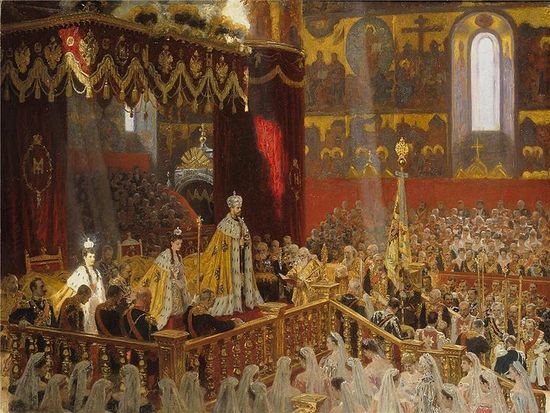 Laurits Tuxen’s 1898 Coronation Portrait of Nicholas II, Dowager Empress Maria Feodorovna, and Empress Consort Alexandra Feodorovna (May 1896, Dormition Cathedral, Moscow Kremlin).
Laurits Tuxen’s 1898 Coronation Portrait of Nicholas II, Dowager Empress Maria Feodorovna, and Empress Consort Alexandra Feodorovna (May 1896, Dormition Cathedral, Moscow Kremlin).


